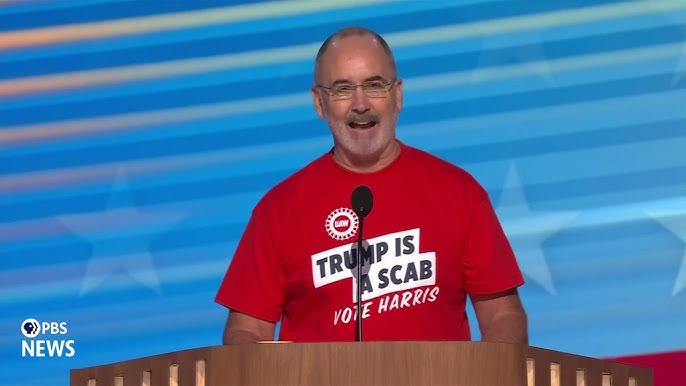The watchword for speakers at the Democratic National Convention last night was “corporate greed.” From Sean Fain, president of the United Auto Workers:
“Corporate greed turns workers blood, sweat, and tears into stock buybacks and CEO stock options. … the divide and conquer tactics of the rich want to blame [the nation’s problems] on LGBTQ+ people or some destitute person on the border, to keep the focus off the enemy, which is corporate greed.”

From Rep. Alexandria Ocasio Cortez: “Kamala Harris is as committed to our reproductive and civil rights as she is to taking on corporate greed. … Trump would sell the United States for $1 to line his own pockets and greasing the palms of his Wall Street friends.”
Someone must have done a poll.
Interestingly, AOC, who has been one of the most outspoken critics in Congress of Israel’s brutal attacks on Gaza, said only that Harris “is working tirelessly for a ceasefire in Gaza and bringing the hostages home.”
Back to corporate greed.
Both Fain and Harris gave powerful speeches on a theme that should be very effective for the Democrats, particularly in mobilizing the progressive base and reaching out to working-class voters who have soured on the party’s increasing connections to the financial sector and big tech.
Fain is correct that corporate greed is causing severe economic damage, and he’s correct that one important solution is empowering unions to fight for higher wages. AOC is correct that the next president needs to take on corporate greed.
This fits in with the new Harris proposal for a federal ban on price-gouging by food producers and big grocery chains. Plenty of economists, including Paul Krugman and Robert Reich, have explained in detail how price hikes to boost corporate profits are a big cause of the current inflation problem.
Harris didn’t actually suggest price controls, although the right wing is going to portray her has some sort of communist. The truth is, price controls have been very effective in some areas; controls on rents in major cities have had a huge impact on housing affordability. (The last president to propose sweeping price controls to control inflation was Richard Nixon. He also froze wages.)
But corporate greed, while an excellent target, is only one part of the crisis in economic inequality that has devastated the middle class, driven up housing costs, made higher education and healthcare far too expensive, and is an existential threat to modern society.
The other side is billionaire greed—and tax policy.
Many of those billionaires donate to Democrats.
Thomas Piketty, the French economist who is the world’s leading expert on economic inequality, argues that the only solution to the problem is higher taxes on the rich (he’s not a big fan of billionaire philanthropy). I have yet to find anyone who has successfully challenged his work.
But other than talking about tax cuts and tax credits for the working class, Harris has yet to say anything about raising taxes on the very rich, reforming the scandalous capital-gains loophole (which even Warren Buffet thinks is a scam), or imposing a wealth tax.
Harris told me when she first ran for president that the wealth tax proposal from Sen. Elizabeth Warren made sense (“I think Elizabeth is onto something.”)
That’s probably the last time she ever addressed the issue.
Joe Biden is old, and party leaders were convinced he couldn’t hold his own in a campaign after his terrible debate performance with Trump, but last night he sounded strong and coherent. Yes, he was reading a written speech from a teleprompter, but he can leave the political scene on a high note.
Hillary Clinton? If she’d talked in 2016 the way she did last night, she would have been president. Part of her problem in the race against Trump is that she came off as too cautious, that every single word was carefully scripted, that she didn’t connect with voters. Last night she sounded like someone talking from the heart, not just reading a script.
Tonight: The Obamas.
Barack Obama became president of the United States in significant part because of the keynote speech he delivered at the 2004 DNC. He was an Illinois state senator running for US Senate; his speech electrified the Democratic Party, far overshadowing the nominee, Sen. John Kerry, and immediately made him a contender.
Not sure he can match that tonight, but we will watch.





